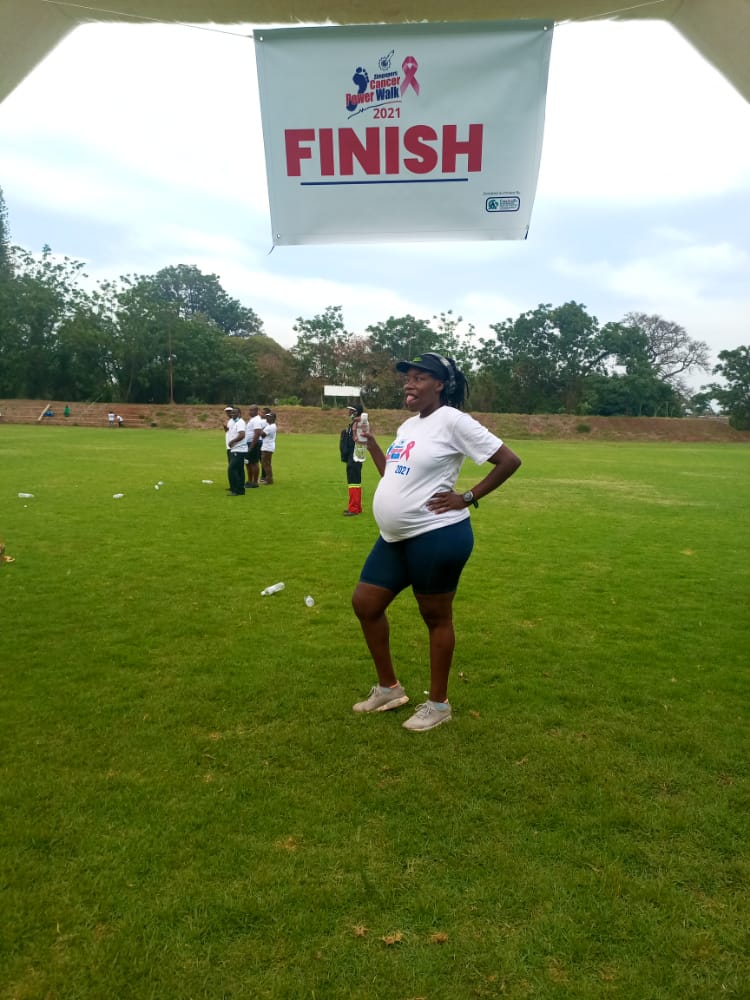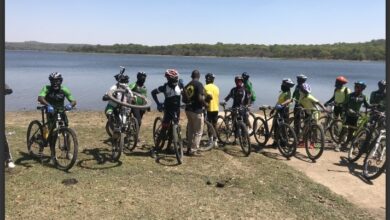Pregnancy, breastfeeding not a disability

LAST year September, a heavily pregnant Ropafadzo Amanda Banhwa turned heads when she completed a 21km race.
It was not just a matter of getting to the finish line, but she concluded her race well ahead of many athletes, both men and women.
Banhwa was seven months pregnant when she entered the inaugural Greatkhalister Half Marathon at the RBZ Sports Club in Mabelreign, Harare.
Come December, Banhwa became a proud mother to a bouncing baby boy, Del Madalisto.
However, being born to a fitness freak, Del has had to make do with lonely moments as his mother carries on with his exercising routine- gym, walk, road run and marathon.
“Well, I do get help. I’m not alone in all this. The baby has a sleeping pattern that rarely changes. So he allows me to run when he sleeps in case he wakes up. Someone will have him until I’m back, but soon I will be back at work, so I will have to reroute the schedule again,” Banhwa told EnterSportNews.
“I am a physiotherapist by profession and specialise in sports and exercise. Basically, besides consulting with my doctor every four weeks to check how good I was at exercising still, I also monitored myself. My doctor thought I was insane but said as long as I was fine and the baby okay, the limit was about me being tired. Running for me is a good way to relax my mind and take time out from the stresses of life, so 21km does not seem too far, considering I have been running 15km with comfort.”
While full-term pregnancy usually lasts about 40 weeks from the first day of a woman’s last menstrual period, Banhwa was actually in a marathon competition at 38 weeks.
Obstetricians advise women to wait until the six-week postnatal check-up before going back to the gym or group exercises. They also warn that it is best not to return to one’s previous level of physical activity until 16 postpartum.
This is a period during the first weeks after giving birth when the body begins to heal and adjust to not being pregnant. When the body goes through many changes as a woman recovers.
However, for superwoman, Banhwa was back on track to training three weeks after giving birth. “My son is two and half months old now, and I am already back to running. I had a race two weeks ago, a 21km event, and I was nine weeks postpartum,” she said.
“This was the Old Mutual Harare marathon, and I was nine weeks postpartum. I started exercises when the baby turned three weeks with 2km walks and then increased the distance to 5km until I felt better and stronger and was now running.”
Banhwa said she did not have as many challenges with sitz baths in her healing process. Sitz baths promote the healing of an anal fissure by soaking the rectal area in a tub of warm water. According to authorities, this is usually done two or three times a day for about 10 to 15 minutes as it helps clean, improve blood flow and relax the anal sphincter.
“I didn’t have outside stitches. I only had seven inside ones, usually taking 10 to 14 days to heal. I couldn’t walk well or stand for long during the first two weeks. So I completely rested. During the third week, I could now walk around, stand and cook without strain,” she said.
“The doctors say up to six weeks (doing sitz or heap baths) because they need to ensure you are healed. But healing should occur by the third or fourth week. And it would help if you always listened to your body. Never force it. And even now, it’s ten weeks postpartum, and I have not started ab exercises. I will start these when I’m 12 weeks postpartum.”
It is always good to exercise regularly; the benefits are immense and help postpartum recovery.
“Well, I am not sure if exercising when I was pregnant helped, but research typically says so. I managed to exercise for 40 weeks and two days. My son arrived on day 40 weeks, four days mid-morning. That’s why I didn’t exercise that day,” Banhwa added.
“I was doing kegel exercises and squats that help strengthen the pelvic area, which is needed during normal delivery.
As the world celebrates International Women’s Month, she said the gift she would give to them and encouraged them that exercising should remain part of every woman’s lifestyle.
“Honestly, I think the exercise helped me (to overcome labour pains) because I never stopped from day one. I had lazy days but tried exercising at least four to six times weekly. And the last few days, I would walk to ensure I keep fit,” she said.
“Well, the experience (labour) made me love my mother more. Labour is not a child’s play. It was short, though. About seven hours from start to finish. Though most of it, I was sleeping.
“We shouldn’t find excuses to say I’m breastfeeding or pregnant because both aren’t disabilities. We also need to watch what we eat and not hide behind eating for two because basically, it’s just an excuse we use.”
“I have always been a fitness freak. I started running in 2013 when I was 142kg and dropped to 79kg. Since then, I have been running and doing gym and other activities. I have done over 20 marathons. To name a few three comrades marathons which are 90km and three Two oceans marathons which are 56km and three Cape town marathons, 42km and I have lost count of 21km and 10km races.”




